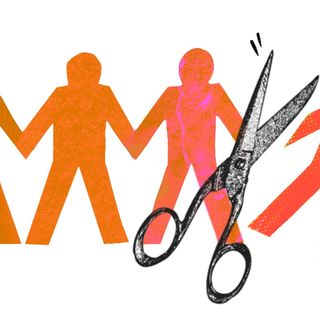
Why People May Be Likely to Cheat if Infidelity Is Common in Their Social Circles
“[E]nvironments in which infidelity is common may provide the justification for abandoning long-term priorities of relationship maintenance.”

Why people cheat in monogamous relationships is a question that social scientists and researchers have been trying to answer for decades now. Some attribute infidelity to certain personality traits while a few others believe one’s genetic disposition might make straying more likely for them. Some also believe our evolutionary underpinnings may provoke cheating on our partners.
New research adds to this discourse, suggesting that infidelity might also be contagious — with our social circles having a direct impact on our tendency to cheat.
Published in the journal Archives of Sexual Behavior, the study found that when people are part of peer groups that treat infidelity as acceptable and include people engaged in affairs, they are likelier to cheat than people in peer groups that look down upon infidelity. In other words, being exposed to people who cheat within their social circle can adversely impact people’s commitment to their own partners.
The reason behind this feels instinctive: social norms often dictate how we live our lives. If the norm is to accept infidelity, then, it’s hardly surprising that the absence of social deterrents like stigma and judgment might encourage cheating, or at the very least, be okay with it.
However, this isn’t to say that infidelity is a bug, and there’s no escaping from if one happens to be surrounded by couples who cheat. “Of course, environments in which infidelity is prevalent do not necessarily turn people into cheaters,” explained the study’s first author Gurit Birnbaum, a professor of psychology at Reichman University in Israel. “Even so, if someone is already vulnerable to cheating or if opportunities for infidelity arise, these environments can give the extra push needed to resolve the conflict between following moral values and succumbing to short-term temptations in a way that promotes infidelity.”
Related on The Swaddle:
As Marriage Has Changed, So Too, Has Infidelity
“[E]nvironments in which infidelity is common may provide the justification for abandoning long-term priorities of relationship maintenance in favor of pursuing tempting alternatives,” she adds.
But the temptation, in question, probably exists already — no matter how latent — for those who ultimately choose to pursue it. A person’s individual outlook towards loyalty and commitment in relationships, too, plays a role.
The study offers new insights on why people may cheat, and what social factors play a role in determining the choices they make. Arguably, cheating in monogamous relationships has no one unequivocal cause — or effect. Infidelity is also known to become a way for people trapped in abusive relationships to find comfort — and freedom, too. “[C]heating made me realize how much better I deserved to be treated, and it ultimately empowered me to leave my abusive relationship,” confessed one woman on the condition of anonymity. Another said, “[C]heating was my escape. It allowed me to put one foot on the other side of the door. All I had to do was pull myself through, and I did.”
That people may cheat more if they see others do it is a tricky idea, a slippery slope that speculates about morality and choice. But one takeaway may indeed be helpful: rather than normalizing infidelity as the absolute norm in social circles, people can become accepting of leaving one’s monogamous partner rather than enduring a loveless — or, worse still, abusive — relationship.
Especially so, in cases of infidelity serving as a means of escape from abusive relationships, where it can usher in guilt alongside freedom. “In this whole being unfaithful business, guilt is a constant — guilt, not for what we feel for each other. I feel very guilty toward society,” R., then 31, who had been having an on-and-off affair with a married man, had told The Swaddle in 2019.
Related on The Swaddle:
Have Humans Evolved to Be Cheaters?
R., in fact, had expressed an inclination to polyamory, too — admitting, though, that she may never try it. “Societal constructs are so strong in my head that even thinking about it out loud is something I haven’t really been able to do. And I’m a fairly free person. But you know the chains that you grow up with never completely free you.”
Society’s treatment of open relationships and polyamory as “alternate” lifestyles, and its idolization of monogamous relationships, perhaps, is what has led to the “hegemonic dominance,” as Birnbaum describes it, of monogamy. One wonders, then, if that weren’t the case whether infidelity would be nearly as common. Instead, perhaps, people could not only leave bad relationships, rather than stick around to escape the stigma of being a “failure;” or, maybe, they could pursue a lifestyle they’re inclined to with like-minded partners, instead of forcing themselves to be something they don’t derive joy from.
This isn’t to say, though, that everyone who isn’t cheating is enduring abuse, or that everyone who is in a monogamous relationship has opted for it fearing the social consequences of choosing otherwise; that would be a rather baseless assessment. What emerges, though, is the fact that social deterrents can discourage people from being themselves, while social encouragement can lead people to cheat even, attests to the power that social norms hold.
And since with great power comes great responsibility, it’s up to us, then, to be responsible about what we choose to normalize — and what we discourage.
Devrupa Rakshit is an Associate Editor at The Swaddle. She is a lawyer by education, a poet by accident, a painter by shaukh, and autistic by birth. You can find her on Instagram @devruparakshit.
Related


‘News Addiction’ Impacts Both Physical and Mental Health, Suggests Study
